hankyoreh
Links to other country sites 다른 나라 사이트 링크
‘In a sense, we are waiting our turn to die’: A family’s year of survival in Gaza
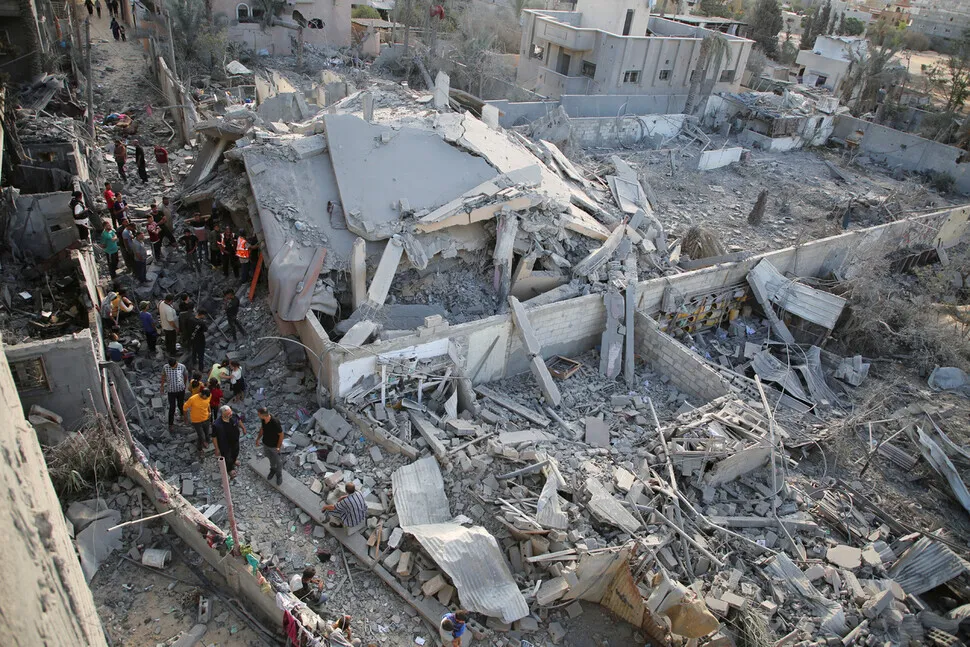
“Israel has attacked us before. In November 2012, the attacks lasted for 15 days. In July-August 2014, they lasted for 60. The past year, however, has been the most horrific time of our lives so far. If we had known that this atrocious war would carry on like this, then…”
Around 8,135 kilometers separate Seoul and the Palestinian Gaza Strip, a 360-square-mile band of land known as the world’s largest open-air prison. Rajaa El-rantisi, a 38-year-old English teacher residing in the Deir Al-Balah Camp, a refugee camp in the south of Gaza, described the past year as a “painful journey.”
The Hankyoreh conducted an interview with El-rantisi via Whatsapp over the span of a month, starting on Aug. 26, to hear about the arduous journey she and her family has made.
On Oct. 7, 2023, at 6:30 am (local time), the Palestinian armed faction Hamas fired more than 5,000 rockets into Israel and sent its agents across Israel’s southern border in a surprise attack. Dubbed “Operation Al-Aqsa Flood” by Hamas, this attack led to around 1,200 Israeli casualties and 240 Israeli hostages. Israel was quick to retaliate, leading to the outbreak of the war in Gaza. Monday marks the one-year anniversary of the start of the war.
On that fateful day last year, El-rantisi, who lived in Gaza City, the largest municipality in the northern strip, was doing what she usually did every morning: preparing her children for school. Facebook was where she found out that a war had broken out. She had no way of finding out more about the situation, and she only realized the gravity of what was happening when she received a message from the Palestinian Ministry of Education declaring that there would be no school from that point forward.
El-rantisi’s fourth daughter, who is 7, had just started school. Her toys and books were still inside the school building. According to the United Nations Office for the Coordination of Humanitarian Affairs, around 90% of Gaza’s population (1.9 million people) have evacuated since the beginning of the war. El-rantisi’s family members are among them.
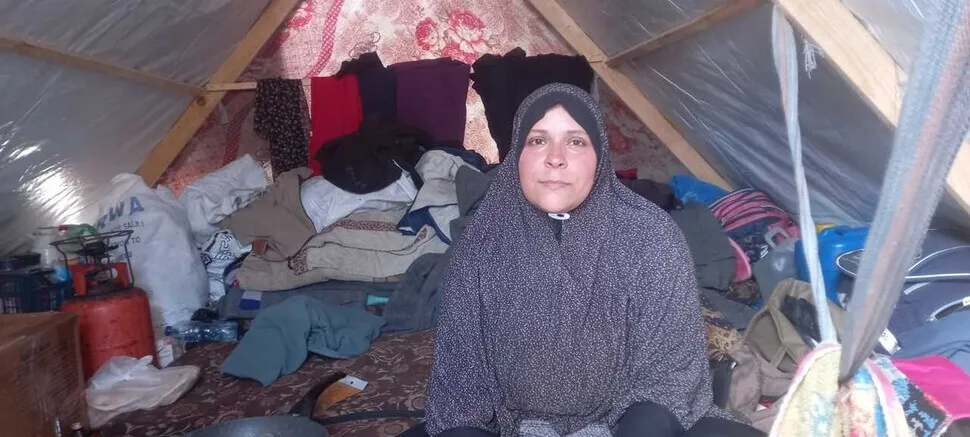
When Nur El-deen, El-rantisi’s husband, suggested that the family move south, they left their home on Oct. 12, only six days into a war they couldn’t have known would last this long. The couple and their five children — 16-year-old Jaber, 15-year-old Maryam, 12-year-old Saleh, 7-year-old Mays, 6-year-old Razan — never expected they would spend so long away from their home once they left.
“We thought we’d return home in a week, so we only took a few items of clothing and some bread. However, we found ourselves traveling to four more cities after our first stop,” El-rantisi said.
Her family first sought shelter by driving to the Nuseirat refugee camp located in the middle of the Gaza Strip, 10 kilometers away from their home. The camp has a long history; first established in 1948, it was where Palestinians fled to during the 1948 Palestine war. On Oct. 13, one day after the family evacuated, Israel ordered the evacuation of 1.1 million of Gaza’s 2.3 million residents from the northern part of the strip.
In the early stages of the war, the Israeli forces focused on assailing the northern part of the region, barraging Gaza City and driving out Gaza residents as if they were animals to be herded to the central and southern parts of the strip.
El-rantisi’s family stayed at a school inside the Nuseirat refugee camp. When she looks back on that fall, she remembers how hard it was to deal with the increasing cold and continuous hunger.
“We needed warm clothes. We had no source of income since the war broke out, but living costs kept rising. Blanket prices doubled, so sometimes we had to pay as much as 25 dollars for one. Potatoes and onions tripled in price, and flour prices skyrocketed, with a 25-kilogram sack of flour costing more than 200 dollars,” she said. For perspective, El-rantisi had earned 400 dollars a month before the war.
“We survived on corn and ground barley, which is usually used for animal feed, and we ate one meal a day,” the mother said.

The family soon learned they would have to leave the refugee camp, with more Israeli airstrikes forcing them to evacuate yet again. On Dec. 20, 2023, El-rantisi’s family traveled 4.2 kilometers to Maghazi, a city in the central Gaza Strip, where her older sister Bushra lived. Aysha, El-rantisi’s other sister, had already settled at Bushra’s house with four other members of her family. With three families of five, seven, and seven, 19 people in total took shelter in that tiny apartment. Bushra’s husband was debilitated by diabetes and kidney disease, so he needed help to be mobile. El-rantisi recalled that it was difficult to get medication for her autistic and schizophrenic nephews.
El-rantisi’s family left Maghazi on Jan. 1, 2024, and traveled 30 kilometers to Rafah, a city in the southern part of the Gaza Strip. Since the city borders Egypt, aid and other goods have entered Gaza through that region for decades, and it also happened to be where her husband’s sister lived. After 10 days of being kept on the edge, wondering if the city would be safe, El-rantisi’s family set up a tent to stay in on Jan. 10.
The family’s first time living out of a tent exposed them to many diseases. Since they were virtually living out on the streets, head lice spread like wildfire. The tent, made of nylon and fabric, was too small and overheated easily, making it difficult to live in. Above everything else, it was hard to access clean water.
“Living comfortably out of a tent is impossible. Since we couldn’t buy fruit, vegetables, or medicine, we kept getting sick. We had to stand in line for three, four hours at a time to get water,” she said.
The refugees had to make do with the same foodstuff provided to them for every meal: rice, spaghetti and lentils. As the war showed no sign of coming to a close, many relied on canned food for nutrition as bread grew too expensive, which only led to malnourishment. Children had to line up for an hour to get their hands on these less-than-adequate meals.
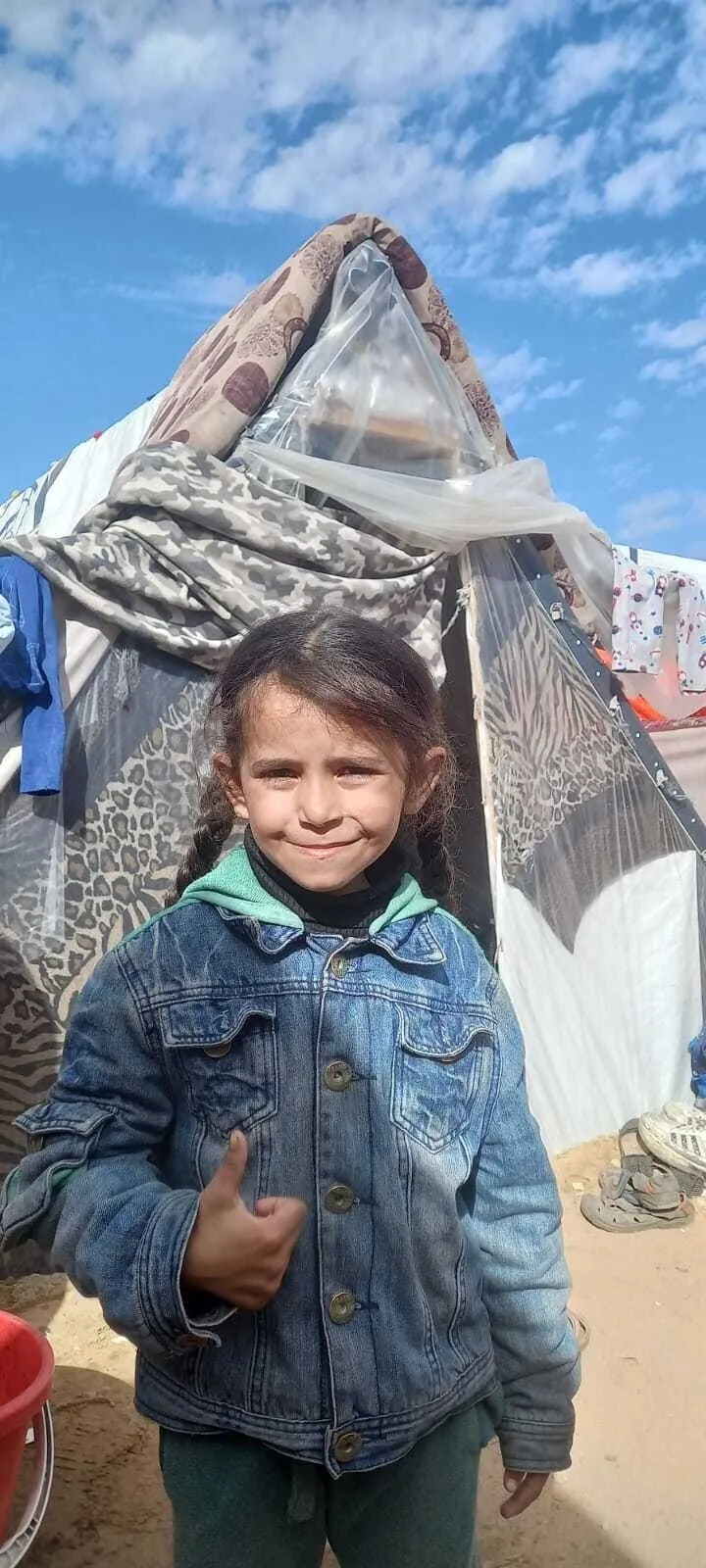
The most traumatic moment that El-rantisi could remember was the night of Feb. 11, when Israeli forces attacked Rafah. This large-scale airstrike killed more than 60 people. After hearing explosions nearby, El-rantisi ran out of the tent and shouted, “There are tanks behind us!” She realized that day that death was always nearby, but that she and her family had been saved by the grace of God.
“We had to hold our children, who were crying and shouting out in fear. I was so afraid that my heart would stop any second,” she told the Hankyoreh.
Since Feb. 21, El-rantisi’s family has been camping out in Deir Al-Balah, a city in central Gaza 21 kilometers from Rafah. Continuous airstrikes left garbage and excrement everywhere, leading to the spread of waterborne diseases. Laundry detergent has grown so expensive, and even if one were able to get their hands on it, washing clothes or dishes is virtually impossible since all sewage facilities to treat dirty water have been destroyed.
The holiday of Ramadan, marked from March 3 to April 9 of this year, is when Muslims normally gather with their families and relatives, but this year's holiday was spent in sadness. The family was barely able to gather news of their relatives, who were scattered throughout Gaza. The tasty food and warm red lanterns of past Ramadans were absent this year. "Only destruction is left," El-rantisi said.
The schools where Palestinian children in Gaza had been educated were mostly destroyed. El-rantisi was furious at the brutal reality of Gaza, where even the future has been destroyed.
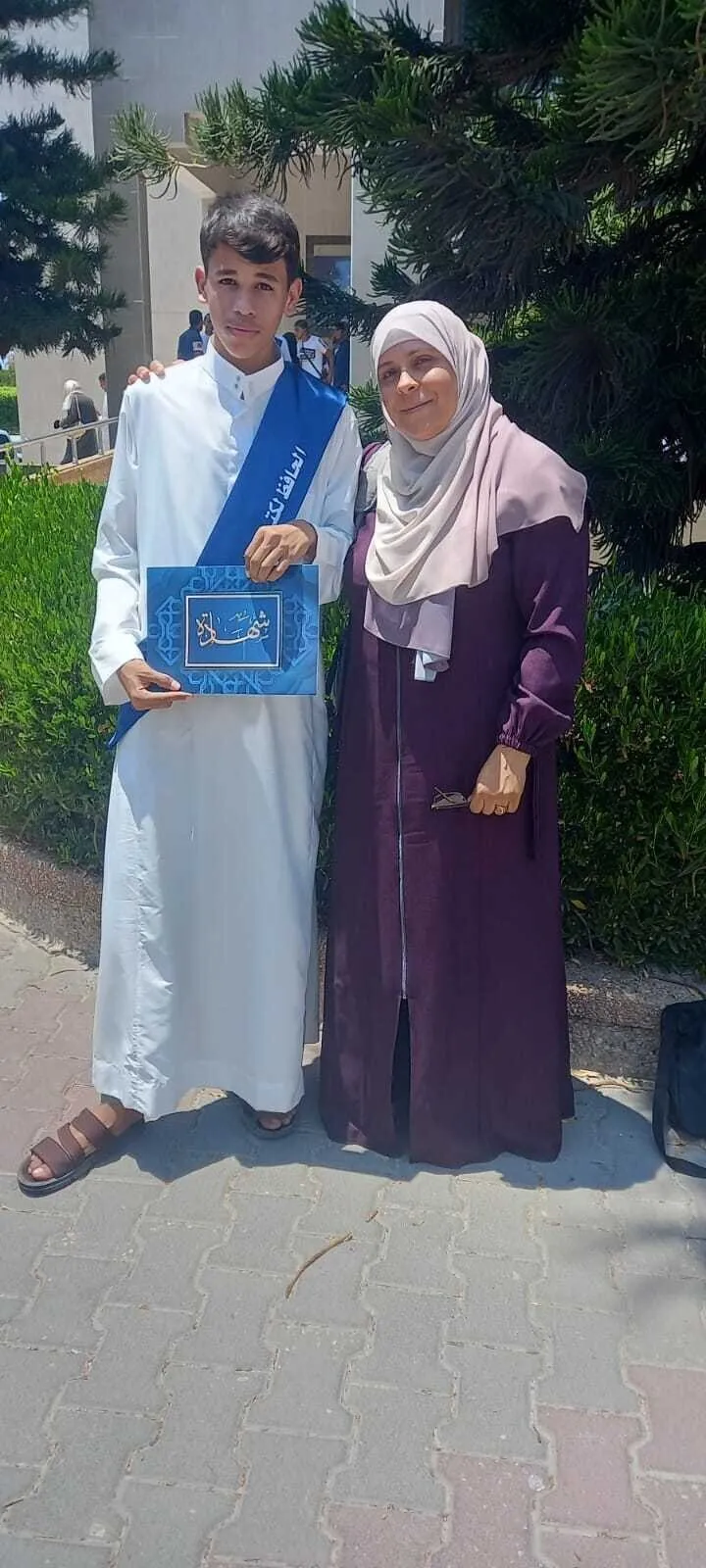
"Nine-thousand children have died, and 500 educational facilities have been destroyed. There are no more teachers to teach or students to learn in Gaza anymore. Our future has no direction. The only left objective in this 'painful journey' is to simply find some polluted water to drink and to survive,” El-rantisi lamented.
For the past 12 years, El-rantisi was known as “the best English teacher in Gaza.” Up until the evacuation, her family was close to being labeled middle class. El-rantisi taught English to 10th graders at Fahmi al-Jarjawi School in Gaza City for a monthly salary of around US$400. Her husband, a barber, earned close to US$700 per month. Photos on her social media reveal that her family owned an apartment, a car and some farmland. The photos showed her going on family vacations, sharing slices of cake with them. Yet since the war broke out, El-rantisi and her husband could barely feed their family after scraping together 400 dollars per month total (1,500 Israeli shekels).
During the clear blue skies of September, the war was in its 11th month. Located only a few degrees of latitude south of Korea, Gaza’s weather at this time of year is similar to Korea's. Thankfully, there was an agreed-upon pause in the fighting to allow polio vaccines to be administered. El-rantisi's 6-year-old and 7-year-old both received oral administrations of the polio vaccines at the refugee camp on Sept. 4.
On Sept. 7, however, El-rantisi heard that Israel had bombed a refugee camp in the city of Khan Younis in southern Gaza, where they had planned to flee. The camp hadn’t been far from the Deir Al-Balah Camp, where she and her family are staying. A day spent in fear and terror has become “normal” for El-rantisi. While the bombings persist, she and her family wait in line for drinking water, dishwashing water, and food, sleeping in refugee tents.
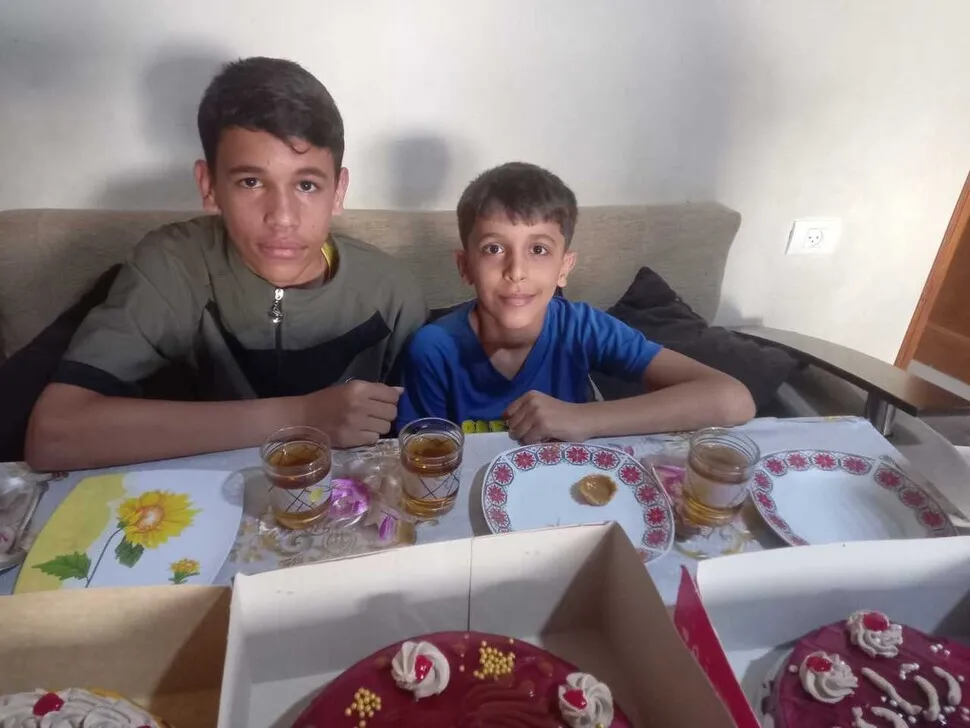
"The sound of bombs is never far away. In a sense, we are waiting our turn to join the others in death. Will it be today or tomorrow? Even if we're not killed by the bombs, we are slowly dying in abysmal conditions,” she told the Hankyoreh.
El-rantisi's family hails from Yibna, where the local occupation has been greatly reduced in the face of the Israeli occupation. Her husband and his family came from Masmiyya, an area that was decimated during the 1948 Arab-Israeli War. The homeland of El-rantisi and her husband, their children, and their parents on both sides is Gaza, a part of Palestine that Israel has locked up in a cage. She's never been outside of Gaza.
"It's been over 70 years since the Nakba,” she said, referring to the war in 1947-1949 that led to Palestinians becoming refugees. “We can never forget our land disappearing and being stolen from us. I want the war to end quickly and live in peace."
When will this "painful journey" in their homeland end? El-rantisi and her family ask the international community. Gaza health officials claim that as of Oct. 2, 41,689 people have been killed in Gaza.
Editor’s note:
Monday, Oct. 7, marked one year since the war broke out in Gaza. The Hankyoreh confirmed that Gaza remains effectively cut off from the rest of the world. We reached out to Rajaa El-rantisi on Aug. 26, communicating with her via WhatsApp over the span of a month to ask her about the condition's she endured for the past year.
People in South Korea can access the internet whenever they want, but El-rantisi’s internet and telecommunications connections were intermittently interrupted by raids. When our reporter sent a question, we'd get an answer two or three days later, which El-rantisi sent by traveling 3 km outside her tent to a location with an internet connection, which she could use for two hours for 1 Israeli shekel (around US$0.26). She used various emojis to express herself: smiley face, tent, sunflower, new moon. She also sent dozens of photos and video footage about her life.
When asked why she was sharing her story, El-rantisi replied, "I want my story to spread around the world and warm people’s hearts. I don't hate the people of Israel."
The Hankyoreh was able to contact El-rantisi with the help of her cousin Saleh, 27, a refugee who's found asylum in South Korea, and Jeong Yeon-yuk, a board member of Hanokers, a civic group that seeks to help refugees connect with their local communities in South Korea.
By Choi Woo-ri, staff reporter
Please direct questions or comments to [english@hani.co.kr]

Editorial・opinion
![[Column] What the media’s Mamdani-bashing missed [Column] What the media’s Mamdani-bashing missed](https://flexible.img.hani.co.kr/flexible/normal/500/300/imgdb/original/2025/1119/8917635396484299.jpg) [Column] What the media’s Mamdani-bashing missed
[Column] What the media’s Mamdani-bashing missed![[Column] Another Eulsa Year, another blow to Korea’s sovereignty [Column] Another Eulsa Year, another blow to Korea’s sovereignty](https://flexible.img.hani.co.kr/flexible/normal/500/300/imgdb/original/2025/1119/7417635391901154.jpg) [Column] Another Eulsa Year, another blow to Korea’s sovereignty
[Column] Another Eulsa Year, another blow to Korea’s sovereignty- [Editorial] South Korea is not a US outpost
- [Column] Trump’s kingdom, Xi’s empire
- [Column] Putting the ‘demos’ back in democracy
- [Editorial] Prosecutors’ selective outrage is self-incriminating
- [Column] Korea’s ‘republic of lawyers’ is only making things worse
- [Column] Trump should win Nobel War Prize
- [Editorial] Boozing, luxe gifts, playing royalty: Yoon and Kim must pay for privatizing power
- [Column] Korea’s young men need liberating too
Most viewed articles
- 1What Pyongyang’s response to US-SK security agreements signals
- 2[Column] Another Eulsa Year, another blow to Korea’s sovereignty
- 3Tokyo-Beijing ties hit a postwar low in 2012 island dispute — this time, it may be worse
- 4Korea signs on to UAE Stargate initiative to create world’s largest AI infrastructure
- 5[Column] What the media’s Mamdani-bashing missed
- 6Local firms predict China will outcompete Korea in all major industries, including chips, by 2030
- 7Japanese woman charged with indecent assault for forcibly kissing Jin of BTS
- 8An upside-down map of East Asia could reshape US military policy in region
- 9Korea wins annulment in dispute with Lone Star, no longer obligated to pay compensation
- 1069% of Koreans use Galaxy phones, but majority of 20-somethings prefer iPhones